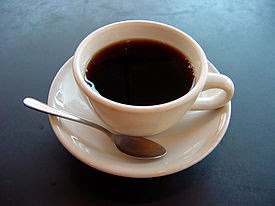| Online: | |
| Visits: | |
| Stories: |

| Story Views | |
| Now: | |
| Last Hour: | |
| Last 24 Hours: | |
| Total: | |
Coffee – a guilt-free pleasure?
A lot of research money has been spent trying to find the bad stuff that coffee does to us. But Monday's piece by Aaron Carroll in the New York Times reviewing the literature concludes that not only is it not bad, it's protective against a lot of diseases. If he's right, then something that's actually pleasurable isn't sinful after all!
The piece had so many comments that the author was invited to do a follow-up, answering some of the questions readers raised. First, Carroll reports that a large meta-analysis looking at the association between coffee and heart disease found that people who drank 3-5 cups a day were at the lowest risk of disease, while those who drank 5-10 had the same risk as those who drank none.
And, by 'coffee', Carroll notes that he means black coffee, not any of the highly caloric, fat and sugar laden drinks he then describes. But, it can't be that all 1,270,000 people in the meta analysis drink their coffee black, so it's odd that he brings this up. Fat and sugar are our current food demons, yes (speaking of pleasurable!), but really, does anyone have “a Large Dunkin’ Donuts frozen caramel coffee Coolatta (670 calories, 8 grams of fat, 144 grams of carbs)” (Carroll's words) 5-10 times a day?
 |
| A lifesaving cup of black coffee; Wikipedia |
So, two to six cups of coffee a day are associated with lower risk of stroke, 'moderate' consumption is associated with lower risk of cardiovascular disease, in some studies (but not others) coffee seems to be associated with a lower risk of cancers, including lung cancer — unless you're a smoker, in which case the more coffee you drink, the higher your risk. The more coffee you drink, the lower your risk of liver disease, or of your current stage of liver disease advancing; coffee is associated with reduced risk of type 2 diabetes. And, Carroll reports, two meta-analyses found that “drinking coffee was associated with a significantly reduced chance of death.” Since everyone's chance of dying is 100%, this isn't quite right — what he means, presumably, is that it's associated with lowered risk of death at a given age, and by implication, longer life (though whether that means longer healthy life or not is unclear).
In the follow-up piece, he was asked whether this all applies to decaffeinated coffee as well. Decaf isn't often studied, but when it is the results are often the same as for caffeinated coffee, though not always. And sometimes true for tea as well. So, is it the caffeine or something else in these drinks?
This is an interesting discussion, and it raises a lot of questions, but to me they have more to do with epidemiological methods than the idea that we now should all now feel free to drink as much coffee as we'd like, guilt-free (though, frankly, among 'guilty pleasures', for me coffee isn't nearly pleasurable enough to rank very high on the list!). Indeed, after presenting all the results, Carroll notes that most of the studies were not randomized controlled trials, the gold standard of epidemiological research. The best way to actually determine whether coffee is safe, dangerous, protective would be to compare the disease outcome of two large groups of people randomly assigned to drink 1, 2, 3….10 cups of (black) coffee a day for 20 years. This obviously can't be done, so researchers do things like ask cancer patients, or people with diabetes or heart disease how much coffee they drank for the last x years, and compare coffee drinkers with non-drinkers.
So right off the bat, there are recall issues. Though it's probably true that many people routinely have roughly the same number of cups of coffee every day, so the recall issues won't be as serious as, say, asking people how many times they ate broccoli in the last year. But still, it's an issue.
More importantly, there are confounding issues, and the lung cancer association is the most obvious one. If the risk of lung cancer goes up with the number of cups of coffee people drink a day, that's most likely because smokers have a cigarette with their coffee. Or, have coffee with their cigarette.
Or, less obviously, perhaps people who drink a lot of coffee don't drink, I don't know, diet soda, and diet soda happens to be a risk factor for obesity, and obesity is associated with cancer risk (note: I made that up, more or less out of whole cloth, to illustrate the idea of confounding).
 |
| Una tazzina di caffè; Wikipedia |
And what about the idea that decaffeinated coffee, and black but not green tea, can have the same effect? If there really is something protective about these drinks, and we're going to get reductionist about it and finger a single component, what about water? Could drinking 10 cups of water a day protect against liver disease, say? True, not all the studies yield the same results, and the black but not green tea association suggests it's not the water, but not all studies show a protective affect of coffee, either. But this idea would be easy to test — Italians drink espresso by the teaspoon and on the run. Do Italian studies of coffee drinking show the same protective effect?
Remember when drinking drip coffee was associated with increased cholesterol levels? Carroll writes:
[A]s has been reported in The New York Times, two studies have shown that drinking unfiltered coffee, like Turkish coffee, can lead to increases in serum cholesterol and triglycerides. But coffee that’s been through a paper filter seems to have had the cholesterol-raising agent, known as cafestol, removed.
High blood pressure and high cholesterol would be of concern because they can lead to heart disease or death. Drinking coffee is associated with better outcomes in those areas, and that’s what really matters.
So, high blood pressure and high cholesterol aren't in fact associated with heart disease or death? Or, only in non-coffee drinkers? A word about methods is in order. The results Carroll reviews are based on meta-analyses, that is, analysis that combines the results of sets of independently done studies. As even Carroll said, some individual studies found an association between coffee and cancer at a particular site, but the effect of meta-analysis was to erase these. That is, what showed up in a single study was no longer found when studies were combined. In effect, this sort of pooling assumes homogeneity of causation and eliminates heterogeneity that may be present when considering individual studies, for whatever reason. Meta-analysis allows far greater total sample studies, and for that reason has become the final word in studying causation, but it in fact can introduce its own issues. It gains size by assuming uniformity, and that is a major assumption (almost always untested or untestable), which can amount to a pragmatic way of wishing away subtleties that may exist in the causal landscape.
I'm not arguing here that coffee is actually bad for us, or that it really isn't protective. My point is just that these state-of-the-art studies exhibit the same methodological issues that plague epidemiological studies of asthma, or obesity, or schizophrenia, or most everything else. Epidemiology hasn't yet told us the cause of these, or many diseases, because of confounding, because of heterogeneity of disease, because of multiple pathways to disease, because it's hard to think of all the factors that should be considered, because of biases, confounding of correlated factors, because meta-analysis has its own effects, and so on.
One should keep in mind that last year's True Story, and many every year before that, had coffee — a sinful pleasure by our Puritanical standards — implicated in all sorts of problems, from heart disease to pancreatic cancer, to who knows what else. Why should we believe today's Latest Big Finding?
Even if drinking coffee is protective to some extent, the effect can't be all that strong, or the results would have been obvious long ago. And, the protective effects surely can't cancel out the effects of smoking, say, or overeating, or 5-10 coffee Coolatas a day. The moral, once again, must be moderation in all things, not a reductive approach to longer life.
Source: http://ecodevoevo.blogspot.com/2015/05/coffee-guilt-free-pleasure.html



